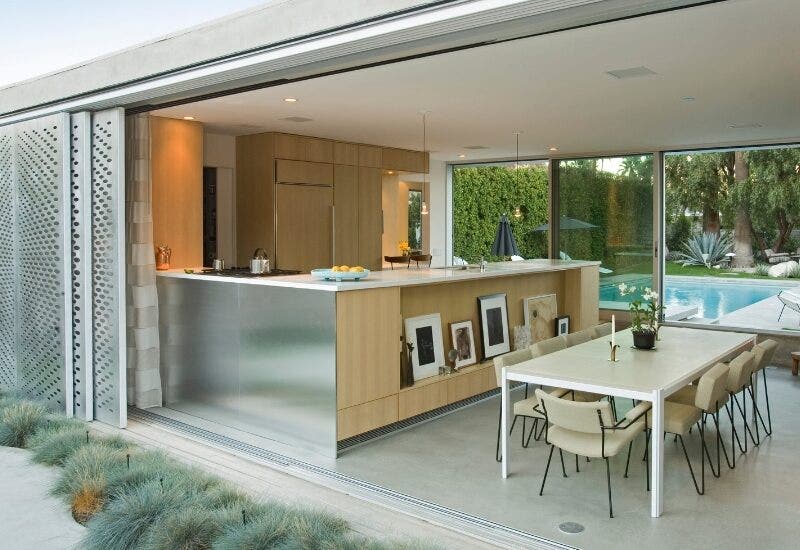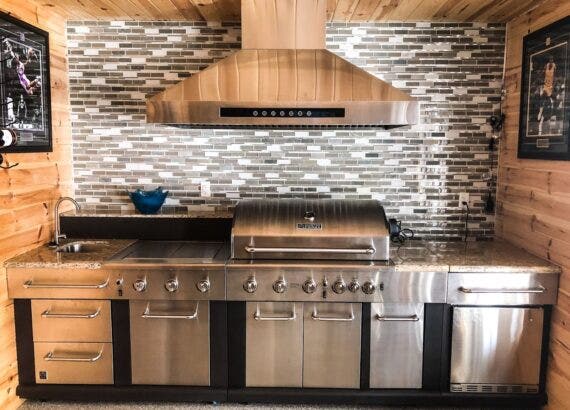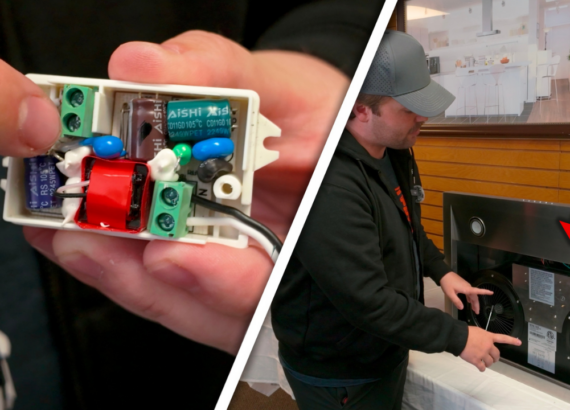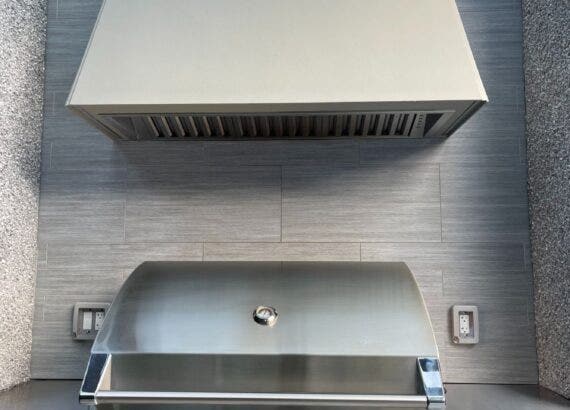Building an Outdoor Kitchen: What You Need to Know Before You Start

Are you considering building an outdoor kitchen or BBQ area? It can be a great addition to your home, providing a functional and enjoyable space for cooking and entertaining. However, before you jump into the project, several important factors must be considered to ensure that your outdoor kitchen meets your needs and fits your lifestyle.
Table of Contents
Location
One of the most important things to consider when building an outdoor kitchen is the location. Think through the amount of space you have and what will comfortably fit. Do you want an elaborate multi-piece kitchen island set, complete with a grill, fridge, and refreshment bar, or a simpler setup with just a grill and some counter space?
Here are a few things to keep in mind:
Accessibility
When choosing a location, consider how accessible it is. You don’t want to have to carry food and supplies across a large distance to get to your outdoor kitchen. An ideal location is 15 to 20 feet from your indoor kitchen. This will make it easy to transport food and supplies from one kitchen to the other.
Another thing to consider is how accessible it is for your guests. Make sure that there is enough space for everyone to move around comfortably. You don’t want your guests to feel cramped or crowded while you’re cooking.
Weather Conditions
What will you need to protect your outdoor kitchen from the elements?
If you live in an area with a lot of sun, consider placing seating where guests won’t be facing the intense rays of the setting sun. Consider adding a pergola or other type of shade structure to protect your guests from the sun.
If you live in an area with a lot of rain or snow, make sure that your outdoor kitchen is covered or enclosed to protect it from the elements. Keep your guests warm during the cooler months by installing a heater or another type of heating system.
Design
Designing your new outdoor kitchen can be a lot of fun and requires careful consideration of several factors, including size, layout, and materials. Here are some things to keep in mind when designing your outdoor cooking area.
Size and Layout
The first thing to consider when designing your outdoor kitchen is the size and layout. You need to determine how much space you have available and how you want to use it. Consider the following:
- What appliances do you want to include?
- How many people do you plan to entertain?
- What is your budget?
Once you have a clear idea of what you want, you can start to design your layout. Consider the flow of traffic and how you want to use the space. You may want to include a separate prep area or a bar for guests to sit at while you cook.
Materials and Finishes
The materials and finishes you choose will impact the space’s look and functionality. Here are some things to consider:
- What type of countertop do you want?
- What type of flooring do you want?
- What type of cabinets do you want?
- What type of appliances do you want?
When choosing materials and finishes, consider durability, maintenance, and style. You want materials that can withstand the elements and are easy to clean. You also want finishes that complement the style of your home and outdoor space.
Functionality
Before starting to build, it is important to consider the functionality of the space. This includes the cooking appliances, storage and organization, as well as lighting and electricity.
Cooking Appliances
One of the primary functions of your new space is cooking, so selecting the right appliances is crucial. An important appliance for any outdoor kitchen is a grill, but other appliances such as smokers, pizza ovens, and even rotisseries can enhance the cooking experience. Consider the size and type of appliances that will fit your needs and budget.
And of course if you are going to be covering your space at all you will need a powerful outdoor range hood like one of these.
Storage and Organization
Another important aspect of functionality is storage and organization. Adequate storage is necessary for storing cooking utensils, plates, and other items. Consider installing cabinets, drawers, or shelves to keep everything organized and within reach. Additionally, having a designated prep area can make cooking and cleaning up easier.
Lighting and Electricity
Lighting and electricity are often overlooked but are important for functionality and safety. Proper lighting can enhance the ambiance and allow for cooking and entertaining after dark. Electrical outlets can power appliances, lighting, and even sound systems. Consider installing GFCI outlets for added safety.
Budget
Budget is an important consideration when planning an outdoor kitchen or BBQ area. It is essential to have a clear idea of the project’s total cost before starting. This section will cover the cost of materials and labor and additional expenses to consider.
Cost of Materials and Labor
The total cost can vary depending on the size of the project, the quality of materials, and the complexity of the design.
The average cost of an outdoor kitchen is around $10,000. However, the cost can range from a few thousand dollars to $60,000 or more. The main factors that affect the cost are the size of the kitchen, the quality of materials, and the number of appliances.
We wrote a whole article on budgeting and expense considerations for your outdoor kitchen here.
When it comes to labor costs, hiring a professional contractor can add significantly to the total cost. However, a professional contractor can ensure the project is completed correctly and up to code. It is essential to get multiple quotes from contractors and compare them to ensure you get a fair price.
Additional Expenses
In addition to the cost of materials and labor, there are other expenses to consider when building an outdoor kitchen or BBQ area. These expenses can include:
- Permits and fees
- Plumbing and electrical work
- Outdoor lighting
- Furniture and decor
- Maintenance and upkeep
Plumbing and electrical work can be expensive, and outdoor lighting can add significantly to the cost. Considering these expenses when creating a budget is essential to ensure that you have enough money to complete the project.
Legal Requirements
Here are some of the legal considerations to keep in mind:
- Permits: Depending on your location, you may need to obtain permits before building an outdoor kitchen. Check with your local officials to ensure that you comply with all necessary regulations.
- Building Codes: Ensure your kitchen space meets all building codes and standards. This includes electrical, plumbing, and gas line installations.
- Insurance: Check with your insurance provider to see if your homeowner’s insurance policy will cover your new project. If not, you may need to purchase additional coverage.
Additionally, it is important to consider the safety of your outdoor kitchen. Here are some safety tips to keep in mind:
- Fire Safety: Make sure that your new kitchen is a safe distance away from any flammable materials. Keep a fire extinguisher nearby in case of emergencies.
- Gas Lines: Only trained and professional plumbers or mechanical contractors should install gas lines. Ensure that all gas lines are properly installed and inspected before use.
- Electrical Safety: All electrical installations should be done by a licensed electrician. Ensure all outlets are GFCI protected and all electrical appliances are properly grounded.
Conclusion
Building an outdoor kitchen or BBQ area can be a great addition to any home, but it requires careful planning and consideration. By following the tips and advice outlined in this article, homeowners can create a functional and enjoyable outdoor space that meets their needs and fits their budget.
Before starting the project, it’s important to determine the outdoor kitchen’s location, size, and layout. Homeowners should also consider the materials, appliances, and features they want to include and any necessary permits or regulations.
Once the planning phase is complete, it’s time to start building. Homeowners can choose to DIY or hire a professional contractor, depending on their skill level and budget. Regardless of who does the work, it’s important to ensure that the outdoor kitchen is built to code and is safe to use.
We have som many customers that enjoy cooking, entertaining, and relaxing in their new outdoor space. With the right design and features, an outdoor kitchen can add value to a home and create lasting memories with family and friends.
Related Articles
- Outdoor Range Hood Dimensions: How Wide It Needs To Be (Pro Tips)
- Range Hood Dimensions: Balancing Functionality and Aesthetics for Your Dream Kitchen
- 4 Types of Range Hoods to Never Buy! (And Why)
- Determining the Ideal CFM for Your Outdoor Range Hood (From the Pros)
- Does an outdoor kitchen need a vent hood? (From Experts)







Comments are closed.